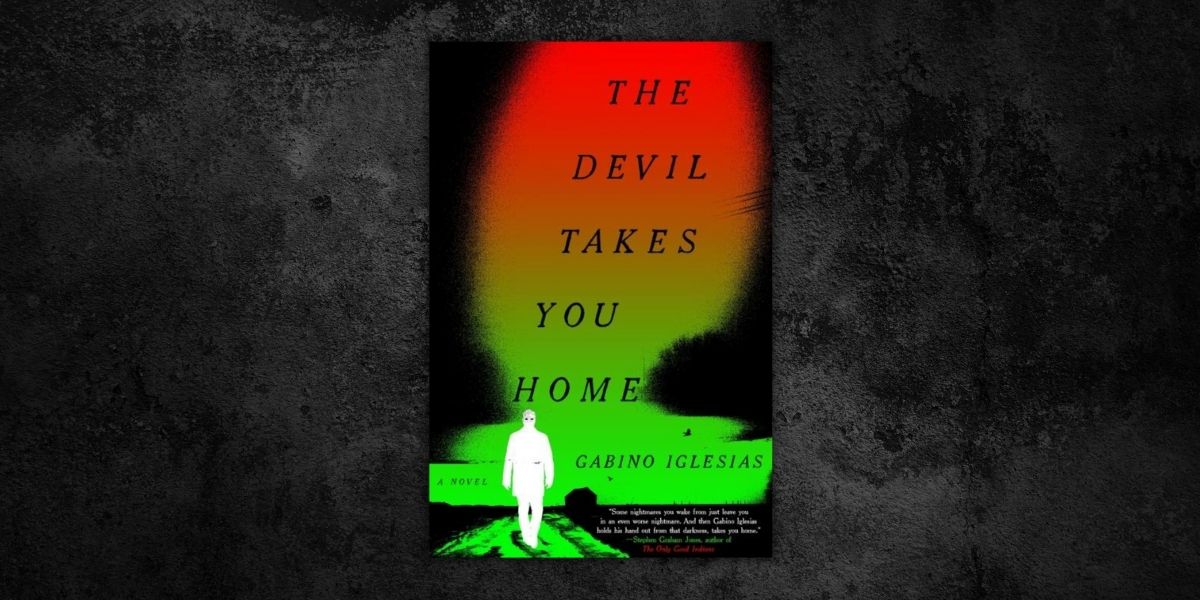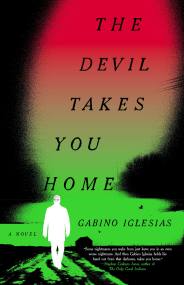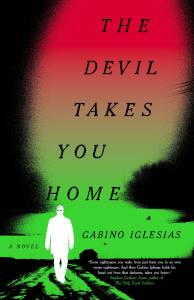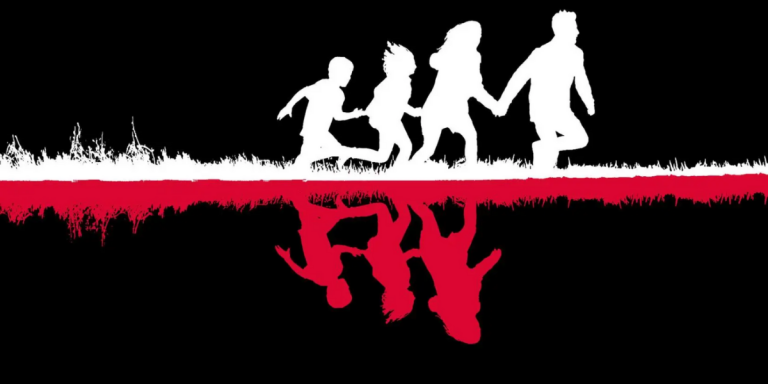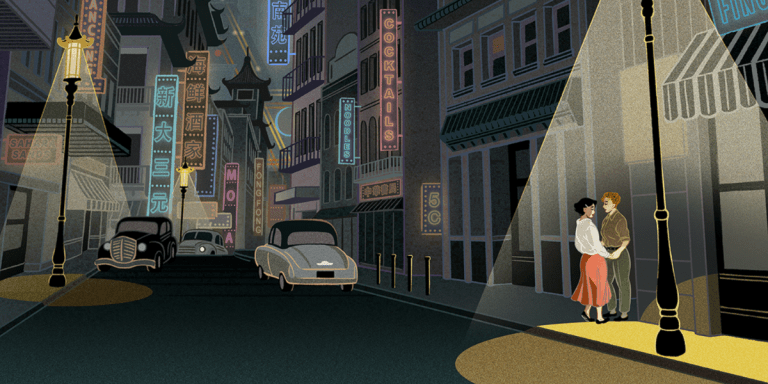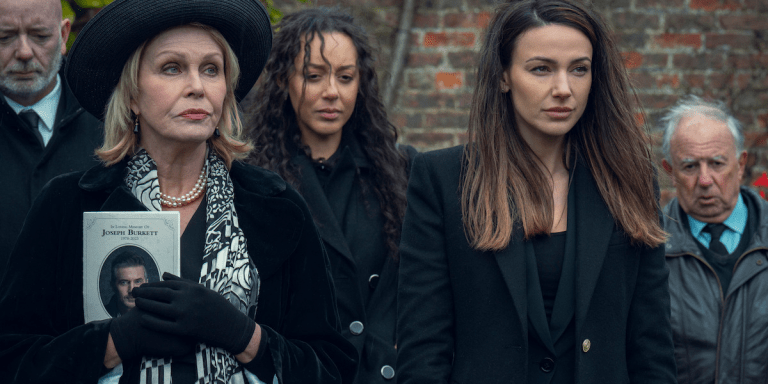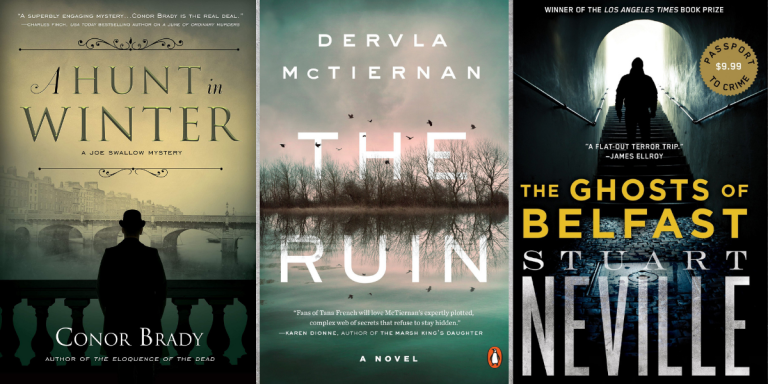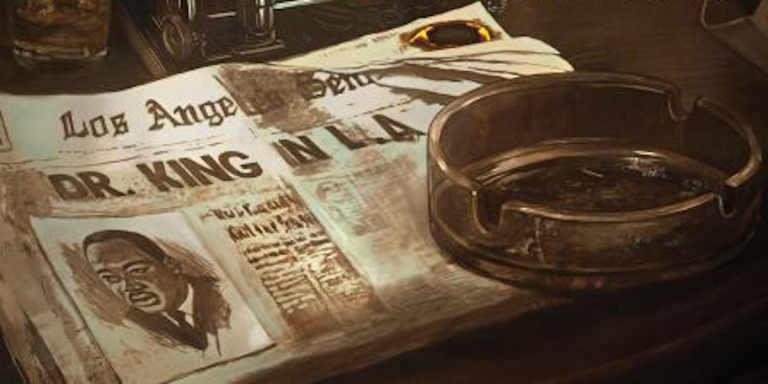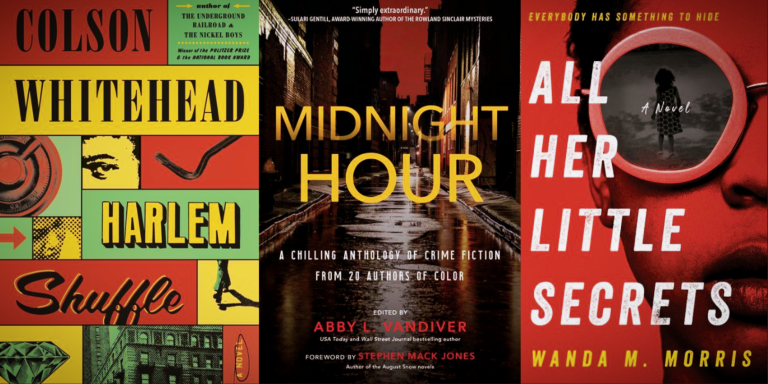Read the Excerpt: The Devil Takes You Home by Gabino Iglesias
CHAPTER 1
Leukemia. That’s what the doctor said. She was young, white, and pretty. Her brown hair hung like a curtain
over her left eye. She talked to us softly, using the tone most people use to explain things to a child, especially when they think the kid is an idiot. Her mouth opened just enough to let the words flow out. She said our four-year-old daughter had cancer in her blood cells. Our Anita, who waited in the other room, playing with Legos and still wrapped in innocence. Acute lymphoblastic leukemia. Those strange words were said in a voice that was both impossibly sharp and velvety. Her soft delivery didn’t help. You can wrap a shotgun in flowers, but that doesn’t make the blast less lethal.
The young, white, pretty doctor told us it was too early to tell for sure, but there was a good chance that Anita was going to be okay. Okay, that’s the word she used. Sometimes four letters mean the world. She immediately added that she couldn’t make any promises. People fear being someone else’s hope. I understood her, but I wanted her to be our hope.
The doctor gave us a moment to process what she’d said. Silence is never as cold and sterile as it is in hospitals. My wife, Melisa, and I breathed in that silence and waited. We didn’t look at each other, but I could feel the panic setting in, circulating through my wife like she was radioactive. I wanted to hold Melisa, to comfort her and say it’d be okay, but I was scared of making any sudden movement. I gently cupped my hand over hers, but she pulled away, quick and violent like an invisible shanking, so instead I stared at the doctor’s white coat. Embroidered in blue right above the pocket, it read: Dr. Flynn.
The doctor inhaled. From the other room, the sound of
Anita giggling reached our ears. It felt like God had punched me in the heart, and Melisa choked back something. A sad woman is a blade hanging over the world, threatening to fall at any moment.
Dr. Flynn inhaled again and then explained to us that acute lymphoblastic leukemia is a type of cancer that affects bone marrow and white blood cells. It’s a relatively unexceptional error in the body, the most common childhood cancer. A glitch in the bone marrow, she said. Then she looked at us and said bone marrow is the spongy tissue inside our bones where blood cells are made. You know, because she probably thought we were stupid. When you have an accent, people often think you possess the intellect of a fence post.
Dr. Flynn wanted us to know many children make relatively quick recoveries from leukemia if they are diagnosed early and start treatment immediately. But she reiterated that they couldn’t make any promises because cancer is always a tricky thing, “a slippery opponent,” she said in an attempt at levity that must have gotten a strained smile from some bewildered parent once upon a time and the good doctor had kept it in her repertoire ever since.
When your child is healthy, you think of sick children and feel like crying, like helping. When your child is sick, you don’t give a shit about other children.
Dr. Flynn tilted her head, shifted the curtain over her eye an inch to the side with her fingers, and placed a manicured hand on Melisa’s shaking shoulder. Dr. Flynn’s rehearsed sympathy looked as legitimate as her perfect nails. I knew we were just another case on her stack and she was throwing us a sliver of hope so we could hold on to it, hold on to anything at all. Still, we believed her. We needed to believe her. I looked at her snowy coat and thought about an angel. She would deliver us a miracle. There was no other option. Not believing her meant something so horrible my brain refused to acknowledge it.
When the doctor walked away, my wife started saying “Mi hija.” My daughter. She sat down. She cried. She repeated “Mi hija” again and again. She said it until it became the heartbeat of our nightmare.
Mi hija. Mi hija.
I said nothing, fear something I couldn’t or wouldn’t speak to. All I could think of was getting into the other room and scooping Anita up into my arms and holding her there forever. Melisa’s big brown eyes were wild. She gulped air and looked around, surely trying to calm down so we could go see our daughter without alarming her. Funny how parents can take a bullet and smile if they think it’ll keep their kids from worrying or crying.
Anita was only four years old and had always been healthy up to that point. She’d never had anything worse than a cold, a few ear infections, and the random teething fever or stomach bug. Chemotherapy would work wonders on her. It had to. Medical research had made tremendous advances in the field. We lived in the future. It would all be okay. All we had to do was stay strong. Our little angel would go into remission in no time. God was good. He wouldn’t let a baby suffer. No one deserves miracles more than unlucky angels. It would all be fine. God and chemotherapy, a winning duo, right? We convinced ourselves of this. Our baby was too full of life, too strong-willed, to lose that battle. Our baby was too loved to die.
Finally, Melisa let out a shuddering breath and looked at me. Something cold had crept into her eyes. She twisted her mouth into something akin to a smile as her eyebrows fought to bring her whole face down.
“Let’s go get our baby,” she said.
Melisa walked into the room and scooped our daughter up. She buried her head in her neck and tickled her with kisses to hide her red eyes and nose. I hugged them both and felt fear stab my heart.
I couldn’t breathe right for two days. I felt like an alpinist who runs out of bottled oxygen near the summit of Everest. But then I saw Anita’s smile, and hope blossomed in my chest. It was a warm, comforting feeling that allowed me to start breathing normally again.
Then came the nasty surprises.
CHAPTER 2
Turns out we hadn’t caught the monster as early as they thought. It also turns out little brown girls with acute lymphoblastic leukemia tend to have a lower cure rate than children of other races. Oh, and the incidence of leukemia is higher among Hispanics. Even awful diseases are fucking racist. And you know the worst part? The wonderful doctors at the hospital couldn’t tell us why. Yeah, the difference between a curandero spitting rum in your face and a doctor looking at you with no answers is a white
coat and the smell of disinfectant that surrounds the latter.
The poison in Anita’s veins wasn’t happy with invading her blood; it also wanted to know what she was thinking, to ride the contents of her dreams, so it attacked her cerebrospinal fluid. Le invadió los pensamientos. Se metió en sus sueños and it slowly killed ours.
The strangest thing about it, the thing that made me so mad I forgot to be sad for a while, was that I’ve had a gift my whole life. When bad things are about to happen, I get this cold feeling in my gut. I hear things. A word. A whisper. A waking dream. Something that keeps buzzing around me until I pay attention. Whenever that happens, I’ve kept alert, stayed sharp. Been that way since I was a kid.
My junkie mother always said I had angels floating above me. I’d been born inside the amniotic sac, and she claimed that gave me the ability to see both sides of the veil. On dark, quiet afternoons when my mother only left the beige to go to the bathroom, she would look at me and declare she could hear the angels talking, showering the top of my head with secrets of things to come. She told me I had to learn to listen to them. “Escucha a los angelitos, mijo,” she’d say. Then she’d grab her stuff from the small box next to the sofa, cook herself a fix, and plunge a syringe full of warm visions into her destroyed veins. I guess she wanted the angels to talk to her too. She wasn’t entirely right about the voices, but she wasn’t entirely wrong either. No one talked to me, but I knew things, heard things. Sometimes it was even in the absence of sound. For example, I woke up to an eerie silence one morning and knew that the lack of a second breath in our trailer meant Mom was gone. I didn’t even have to get up and check. Tears were streaming down my face before my feet touched the floor. I also thought about my friend Hector while doing homework one day and then the world stopped humming for a few seconds. I knew he was gone. The next day at school, they told us his dad had been driving while intoxicated. The man had wrapped his car around a pole, killing himself, his wife, Hector, and his baby sister, Martita.
The point is that my little angel had always been okay and I had never gotten the sense that something awful was about to happen. No dreams, no worries, no words in the wind, no whispers in the middle of the night, no fear, ni una corazonada. Whoever or whatever took care of letting me know about bad things coming had decided to keep quiet about the most important thing in my life. This time, sadly, los cabrones ángeles decidieron quedarse callados. When it came to Anita, nothing had looked out of place. Melisa hadn’t even thought to mention that the pediatrician had noticed some unusual swelling at Anita’s yearly checkup and ordered some additional bloodwork “just to be safe.” Melisa probably didn’t want me asking if our crappy insurance would cover that expense.
Within weeks of the diagnosis, our Anita went from a ball of unstoppable energy to a thin bird with broken wings. I’d hold her tiny body against mine and feel everything inside me break at once. An invisible monster was devouring her, feasting on her innocence, and there was nothing I could do about it.
So we prayed. Melisa and I prayed with clasped hands and gritted teeth. We prayed with a rosary clutched so tightly in our hands that our palms would sport tiny half-moons for hours. We prayed with spittle flying out of our mouths and tears in our eyes. We prayed and made deals, made promises, made threats. We prayed with every ounce of energy in our bodies. We asked La Virgencita to save our baby. We asked God to intercede. We asked the angels to lend a hand. We asked the saints to help us win this battle. They all stayed quiet, and death lived in that silence.
When Melisa started lighting strange candles, tying blessed ribbons to Anita’s hospital bed, and using holy water to make crosses on our baby’s forehead, I didn’t ask questions or try to stop her. She was sad and desperate. She was willing to try anything to bring the holy into that hospital room. She had carried our child for nine months, and I knew losing her was like someone pulling out her heart and lungs. On good days, I understood her and prayed with her. On bad days, I stayed in the cafeteria, sipping atrocious coffee, thinking about punching doctors for not doing their job, and having a hard time processing just how pathetic Melisa had become, begging for a miracle that was obviously not coming our way.
You don’t know horror until you’ve spent a few hours inside a hospital looking at the fitful sleep of a loved one who is being taken from you. You don’t know desperation until the uselessness of praying hits you. I stopped eating and sleeping. I became a fuzzy copy of the man I used to be, an unshaved mess full of anger and pain and tears. Me llené de odio y desesperación.
A few weeks into our new reality, a human resources specialist from my office called. It was someone I’d never met. She said she was sorry to hear about Anita’s health and then said she regretted to inform me they had to let me go because I’d used up all my sick days, personal days, PTO, and then shattered every absenteeism record in the company. I hung up. Your daughter has cancer, but you’re not being productive, motherfucker, so we’re firing you. Welcome to the American Dream.
The medical bills had already started showing up. “Every time we breathe in that hospital, someone writes us a bill for it and now we don’t even have insurance,” said Melisa. Her voice was full of quiet anger. She’d lost weight, and her cheekbones looked like weapons constantly threatening the world.
“We’ll get the money somehow.”
“You always say the same thing. We’ll get the money somehow. We’ll make it work. We’ll be okay. I’m tired, Mario. Estoy tan cansada. Every day Anita spends in there, every new treatment and test she gets, adds to the pile of bills. What we have is not enough now and won’t be enough anytime soon. It’s never enough! We’ve been doing our best for so long and we’re still more or less where we started. And now our baby—”
Her voice broke like a glass thrown against the floor, fast and sharp. I got up from the sofa and held her. It was the only thing I could do. Her body trembled in my arms. Anita’s sickness was a new reality we woke up to every day, but this scene wasn’t. Holding her felt old already, like something I’d done too much and was ready to never do again. Talking about money was worse. The discussion felt like a nightmare we’d carried from a time before we met each other, and then we’d created a larger one by putting our problems together. Every time the car broke down. Every time we needed dental work. Every time bills piled up and we felt like we were losing control, we’d end up like this. I wished I’d held her for different reasons.
Melisa looked up at me. Her brown eyes shiny, her face red and still beautiful.
“What are we going to do?”
“We’ll think of—”
She pushed me away. Hard. I wasn’t expecting that.
“Don’t say it. Don’t fucking say it. God always takes from those who have nothing to give, and I’m tired of it.”
The next day, God kept punching. We spoke to Dr. Flynn first. She said she was surprised at the inefficacy of the treatment. She had one of her colleagues, a chubby man with big ears and yellowing teeth, talk to us.
“This is a fascinating case,” he said. “The survival rate is about 98 percent, and the small percentage of deaths we see can be mostly attributed to late diagnoses. In Anita’s case, we’re not within the optimal window of time in terms of detection, but we’re also not too far from it. The aggressiveness of her leukemia is bizarre. She is truly a fascinating case.”
Something stirred in me while he spoke. The doctor droned on and on, talking about Anita the way someone would talk about a lizard with three heads. Then he pulled out some papers. As he fingered through the pages, I had the sudden urge to grab them out of his meaty hands and shove them down his throat. Anything to make him stop talking. Melisa squeezed my arm. She always knew when I was tuning out. Squeezing my arm was her way of telling me to pay attention.
“There is an experimental treatment I’d like to run by you. We’ve seen great results with monoclonal antibodies in children that don’t take to chemo the way we’d hoped. I won’t chew your ear off, but Anita could be part of this clinical trial. We’re talking about really potent man-made antibodies that can attach themselves to certain proteins found on cells. What the—”
“I’m sorry, Dr. Harrison, but who pays for these clinical trials?” Melisa interrupted.
“Insurance should pay for most of the costs. Once you meet your deductible that is, but that shouldn’t be a problem for you.” He chuckled again. “And of course you’d have to be in network and there are always the costs of extra meds—”
My hands were on Dr. Harrison before I even realized I had jumped out of my seat. “Fuck you, fuck the treatment, fuck the insurance, and fuck this damn hospital!” The papers he was holding flew up and then drifted down to the floor like wounded birds. No one spoke for a moment. Tennis shoes squeaked against the floor, and Melisa’s hands were on my shoulders. She was saying something, but it was like this thing inside me had taken over.
I wanted to hurt the asshole who’d called my baby a “fascinating case,” but Melisa pulled me away, apologizing, as Dr. Flynn looked on in horror, her one visible eye wide with fear.
“This isn’t you, Mario,” Melisa said as we made our way to the parking lot. “I need the sweet man I married with me right now, not . . . whoever this is.”
I had nothing to say. We reached our car and climbed in.
Melisa turned to me, took a deep, shaky breath, and squeezed my hands harder.
“Agárrate de mi mano, que tengo miedo del futuro . . .”
Her soft voice filled the car. It was an old Ismael Serrano song. The darkness receded.
“Look at me, Mario.” I did. “We’ll get through this. It’s what we do. We’ll make it work. We’ll get the money.”
CHAPTER 3
I checked a few sites and sent out some résumés, but nothing happened. I’d gotten used to that. If your name has too many vowels, getting a job is ten times harder than if your name
sounds like it belongs in the credits of a Hollywood movie.
When you’re poor, getting money occupies your mind at all times anyway, but this was different. We needed a thousand dollars a month just to cover Anita’s meds for the clinical trial, and that didn’t include insurance costs or the back-and-forth visits between our home in Austin and Houston’s med center. Finally, when it was clear even the McDonald’s wasn’t interested in an interview, I called Brian.
We’d worked together years ago at the insurance agency. Now Brian was a dope dealer and habitual meth smoker. Not exactly friends, we’d been two souls caught in the same soulless gig, and that made us gravitate to each other, to talk about movies and places we’d like to visit, celebrities we’d like to sleep with. When he got fired from the insurance place, allegedly for selling pirated movies out of the trunk of his car during his lunch hour, we kept in touch with occasional texts.
A year or so after he left, Brian had asked me to collect credit card info at the insurance company and give it to him.
He had someone interested in buying it. Third parties would use the info. “They won’t be able to track it back to you,” he had said. I processed credit card payments from all over Latin America, so it would have been easy and we needed the money then too. I collected the information in no time but backed out at the last minute. I was too afraid of getting caught and leaving Anita and Melisa to fend for themselves while I rotted away in prison. Brian understood and said he always had gigs waiting. “No biggie, man,” he said. “You’re a good dude. Call if the damn poverty noose gets too tight, yeah? I got you.”
Melisa was at the hospital they’d moved us to in Houston when I finally took him up on that offer. By then she was staying most nights. At the start we alternated nights because only one parent could stay, but then getting a hotel stopped being an option because we were too broke. I often slept in the car. Every few days, one of us would drive home to do laundry and bring other things to the hospital. I was home on one of those trips when I decided to call Brian. The medical bills were too much, the insurance that we paid for out of pocket even crappier. Brian picked up on the second ring.
“How much do you need?”
“I need . . . as much as I can get.”
“I can get you money. That part’s easy. You willing to do anything?”
The question was unsettling, but Brian’s tone remained upbeat. I said yes. And I meant it. Those fucking medical bills stood on top of all the others. Rent, electricity, car insurance, and phone bills didn’t give a shit that our daughter was beating back death.
Brian came over a few hours later. He twitched like a broken toy as he pulled out a crumpled piece of paper. There was an address scribbled on it, somewhere on the outskirts of Waco, about halfway between Austin and Dallas. Then Brian handed me a torn photo of a large man wearing an ill-fitting blue suit in front of a beige door. The photo was damp. The man’s red nose spoke of booze, bad nights, and high blood pressure.
Brian got up with a grunt and reached behind him. His hand came back holding a gun. “That’s the dude,” he said while inspecting something on the side of the weapon. His words seemed to ignore the fact that he was holding a gun.
“Here, you’ll need this.” Brian handed me the weapon while mumbling something about the safety and making sure it ended at the bottom of a lake and not in my car. I took the gun from him and looked at it. It looked just like the guns in movies but was heavier than I expected. There was writing on it: 9mm luger. SMITH & WESSON. My gun knowledge was limited, but I knew the thing could spit death and that was all that mattered. We’ve been strangling and beating each other with rocks and sticks since we stopped dragging our knuckles and swinging from branches. Guns are the natural next step. There is some- thing unsettling about how we’re given life and then spend a large part of it trying to engineer better ways of killing others. That said, the cool, hard metal made me feel good.
Brian plucked the gun out of my hand, turned it to the side, and pointed at the safety he’d been talking about. He showed me how to use it. “Two hands,” he said. “Don’t turn it sideways like the idiots in the movies, and for God’s sake, don’t forget the fucking safety.”
His hands were shaky, but I got the gist. When his little class was over, Brian told me to drive to the address he’d given me. Once there, I’d see an abandoned VW van.
“Show up late,” he said. “Go on a weekday. The guy leaves his office around seven or eight every night. He’s one of those assholes who think they can become millionaires if they put in the hours. Anyway, he always stops for a drink or three and a little ass. Fat man loves the sauce and he likes them young, but he’s usually home before midnight. Tries to look normal and shit, you know? Show up before he does and park a few blocks away. Dress like someone out for a walk. You know, like you’re trying to lose a couple pounds or whatever. If no one sees you, hide behind the van outside his house. Wait until the asshole walks up to the door and then shoot him in the back of the head. Then get your ass outta there as quickly as possible.”
The ease with which those words left his mouth shocked me. He was talking about murder. He didn’t mention the sound of the gunshot. He didn’t talk about nosey neighbors. He wasn’t worried about cops immediately pulling up to the property, lights on and guns out. He talked about killing a man with the tone others use to tell you how they prepare their favorite sandwich.
“So just . . . shoot him?”
“Yeah,” he said. “Show up. Boom. Get back. Collect six stacks. Easy gig. Oh, and make sure you get rid of the gun. It can be the one thing you forget about and then it comes back to bite you in the ass.”
He replied with something akin to a smile on his face. I’d get six grand for the job, which was way more than I made in a month at the insurance place. More important, it’d cover Anita’s meds. Then Brian looked at me and, placing his right hand on my shoulder, said, “This is a bad guy. You’re doing the world a favor, man. I fucking swear. You don’t even want to know what this motherfucker does when he thinks no one’s looking. Just trust me, man. This guy is scum, okay? You’re doing the world a favor.”
He was overselling it. I knew Brian was using me and pocketing more than he was giving me. I didn’t care. I needed the money. It was all about Anita. Six stacks wouldn’t be enough to get us out of the hole. It wouldn’t even make a dent in the stack of angry letters and final notices. But if it came down to Anita or this motherfucker, I knew it had to be done. I told myself that if God was busy making little angels sick instead of protecting them, there was nothing wrong with me picking up the slack and putting an end to those who actually deserved it. However, none of that worked too well. Killing is killing. I felt like I was trapped inside a skin that didn’t belong to me. I didn’t even know if this guy was as bad as Brian was saying or if he was feeding me a line to get me to do the job. Maybe the guy just owed the wrong person some money. Maybe he had crossed someone who didn’t have the guts to take him out. The possibilities were endless, and they would all stop mattering the second I pulled that fucking trigger. Bullets don’t believe in remakes or second chances. The thought traveled from my brain to my heart and wrapped itself around it like a creeping vine covered in thorns.
After Brian left, I turned on the computer. The idea of pulling the trigger in a neighborhood didn’t sit well with me. Was there a way to make a homemade silencer? I’d seen them in movies and they always sounded like someone spitting instead of a gunshot.
If a gun embodies everything that’s wrong with humanity, the internet is a festering mirror that shows us what happens when humanity has been completely lost.
I quickly learned a few things. It’s legal to make your own silencer, though those in the know liked to call them suppres- sors. I read hundreds of comments about using a car oil filter or potatoes or a pillow. I doubted any of it would really work, and all the websites telling you how to build a suppressor belonged to the kind of white supremacist who likes to use the word patriot instead of racist. Buying a suppressor was an option, but that took time and left a trail. Since I had no interest in learning how to use my suppressor to survive once the minorities take over the country, I decided to log off and just hope that shooting the man and running would work.
I showered, dressed like someone going for a walk, and left the house.
Melisa called as I was getting dressed. She sounded awake, almost happy, and wanted to know if I’d thrown some chicken breasts in the slow cooker so I could bring her some when I drove back to Houston in two days. I knew I could take care of this guy and fix her up a meal that wasn’t from a hospital cafeteria before she even had a chance to miss me.
Finding the address was easy thanks to my phone’s GPS. The robotic voice mispronounced streets, making me think of an android that was also an angel of death.
A few hours later, I stood behind a rusty VW van with little curtains that had flowers on them. My heart slapped against my chest. There was no one around. I stood behind the van and pretended to look at my phone for a minute. The street was lined with quiet driveways and trees. A few lampposts vomited yellowish light onto cracked sidewalks and tufts of grass. Four houses down, a few toys were lying on the grass. Their loud colors were strident notes in an otherwise mellow suburban symphony. They stabbed my heart with memories I fought to keep locked away.
Sure that no one was looking, I hid between the van and a wooden fence. Vines poured over from the neighboring yard and made for a nice shield. Suddenly the gun weighed too much. It was pulling me down, making me want to melt into the ground and vanish.
Thirty minutes passed. The street was silent. Hiding like this reminded me of playing hide-and-seek with Anita. Children never really hide. They think they can’t be seen if they hide their faces or head. We laugh at that. We find it cute. It’s not. All grown-ups do the same shit. We’re in plain sight, but we hide because we’re using a mask, hiding our real faces from the world. Anytime we’d play, I didn’t even have to look for Anita’s tiny feet poking out from behind the sofa or an arm holding on to the side of a dresser. Every single time we played, her giggling gave her away. Where could she be hiding? I’d ask, sending her into fits of laughter. Before I knew it, I had tears running down my cheeks. She wasn’t playing games now. There were so many cool places to hide in that hospital, but we’d never played hide-and-seek there. The gun stopped feeling so heavy. I was there for her, and I would do the thing for the money. I’d kill a thousand men to get my little angel out of that fucking place.
Another half hour went by. The darkness around me stuck to my skin with the insistence of a child asking an uncomfortable question.
Finally, a car pulled up and the chubby, balding man from the picture slammed the door and made his way up the cracked pathway to the house, breathing like a wounded hog the whole time. I moved to the front of the van, between the grill and the garage door, and focused on my target, letting everything else fade away. Even from a few feet I could see that his pupils were dilated, probably from whatever cocktail of drugs and alcohol he’d partaken of that night, but they looked like two black holes sitting on his ugly face. The man fiddled with his keys as he stumbled up the steps. His stump-like fingers were like useless insects that didn’t know which way to go. It reminded me of that bastard doctor who called Anita a fascinating case.
Suddenly, I wanted to tear those keys out of the man’s hands and use the serrated edges to run through his shadowy eye sockets. I wanted to kill him, to inflict as much pain on him as possible, and I couldn’t explain why. He was a bad man, but I didn’t know how bad. I didn’t know if he deserved to die, but that wasn’t as much of a deterrent as I knew it should have been. Maybe the man had stolen from rich assholes just like him. Maybe he liked blow on the weekends and had snorted more than he could pay for. I didn’t know his crimes, but the desire to punish him was there, as strong as anything I’d ever felt. The feeling scared me, but I kind of liked it too.
I stepped from behind the van as the man finally jammed the key into the door and turned the knob. I took four quick steps forward, placed the gun against the back of his head, and pulled the trigger.
The night exploded in my ears.
The man’s head jerked forward violently as gore splattered against the door. He pitched forward and crumpled at an im- possible angle, his face — or what was left of it—leaving a wild smear of gore on the door. In the dark, I couldn’t see much of what the bullet had done to the back of his head, but I could tell my work here was done. He wasn’t getting up. I didn’t feel bad about it. I felt good. It freaked me out a little and I couldn’t breathe, but it also felt like energy was coursing through my veins. The body on the floor with its brain leaking out, that was a bad man. He deserved it. He was as guilty of Anita’s illness as everybody else.
Those reasons sounded great to me, but they didn’t explain, or excuse, the sense of joy that was blossoming in my chest and threatening to pull my mouth up into a smile.
Something snatched the edge of my vision and I looked down. Pools of red liquid still covered the man’s face, but there was something rippling under the skin. It looked like a ball of the wriggling maggots burrowing in and contorting the flat features of his face. The worms slid down the rolls on his neck, and a thick squelching sound followed.
It was like something was feasting on the man’s flesh, but from inside his skin. Whatever it was, I wasn’t about to stay to find out. As I ran, the blast from the gun was a ghost clacking its teeth at my heels. Only when I got to my own car and tried to pull my keys from my pocket did I realize the gun was still in my hand. Shit. I opened the door, threw it on the passenger seat, and turned on the ignition. I sped all the way to the end of the street.
I was about to blow through the intersection when a woman on foot crossed the street in front of me. She was wearing a dirty white dress, and long hair covered her face. She turned to me and I saw a gaunt face and black holes where her eyes should’ve been. La Huesuda. Death was coming for me.
It looked like she was about to speak, but I didn’t need any messages from the other side when they’d fucking abandoned me when I needed them the most.
I blinked and saw her eyes. The holes had been a trick of the light, shadows playing with my fear as she, a slim woman—probably a homeless person—walked under a streetlight. My heart didn’t slow down, but my fear receded a bit. However, I remained alert, my eyes open and scanning the road and sidewalks ahead. A message could be coming.
I’d had these sorts of waking dreams all my life. For the longest time, I thought everyone had them. What people meant when they said they were daydreaming. My second girlfriend, a young Puerto Rican named Katia who had just moved to Houston and hated everyone in our school, told me that wasn’t the case. It came up in a conversation we had where she told me she knew where people had died in car accidents because she could see the bodies even though they were no longer there. She had to go to school every day and see the headless body of a child near the entrance. I asked her if the dead bodies were ever part of her waking dreams. She had no idea what I was talking about.
Remembering Katia made me think about Melisa and Anita.
These dreams or visions usually arrived when something bad was about to go down, and something awful had already happened. I didn’t have time to worry about visions or anything else right now, not if I was going to get back to the hospital before my girls missed me. I drove on.
Normal people can’t imagine committing a crime, much less killing a person. People who are dead inside are different. Una vez miras a los ojos vacíos de La Huesuda, todo cambia. La muerte recluta soldados sin anunciarse porque su poder es innegable. Besides the money, what Brian gave me that night was a way to make the world pay for hurting mi angelito. I blamed everyone, and now I was getting some revenge. Yeah, any revenge would do. Violence was soothing, a strange balm that made me feel better. The threat of death ruined my life, and in death I hoped to find something like it again.
I was driving into Austin when my phone rang. It was Melisa. All I heard was screaming and crying. I understood her clearly.
I dropped the phone. I stopped the car and instinctively looked back. The car seat stared at me, its emptiness an attack, and my world went in and out of focus. My lungs refused to expand. Something that sounded like the end of the universe erupted from my throat. In front of me, the dashboard became a wet, shivering mess.
Discover the Book
Buried in debt due to his young daughter’s illness, his marriage at the brink, Mario reluctantly takes a job as a hitman, surprising himself with his proclivity for violence. After tragedy destroys the life he knew, Mario agrees to one final job: hijack a cartel’s cash shipment before it reaches Mexico. Along with an old friend and a cartel-insider named Juanca, Mario sets off on the near-suicidal mission, which will leave him with either a cool $200,000 or a bullet in the skull. But the path to reward or ruin is never as straight as it seems. As the three complicated men travel through the endless landscape of Texas, across the border and back, their hidden motivations are laid bare alongside nightmarish encounters that defy explanation. One thing is certain: even if Mario makes it out alive, he won’t return the same.
By clicking 'Sign Up,' I acknowledge that I have read and agree to Hachette Book Group’s Privacy Policy and Terms of Use
